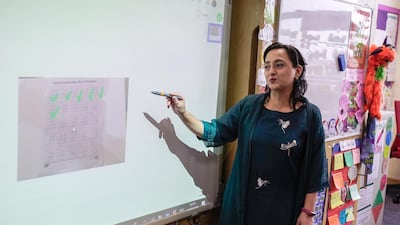On Sunday morning, teachers will arrive at schools and make their way to their classes, but there will be no pupils to greet them.
Instead, children will be perched behind computer screens at home, ready to watch pre-recorded videos instructing activities, as they direct questions at their teacher kilometres away.
Public and private schools across the UAE are preparing to teach pupils through mobile applications and online education platforms.
Teachers said a major challenge could be connectivity as hundreds of thousands of children will be logging in for digital lessons.
Some schools have prepared back-up plans – offline study material – that pupils struggling to stay online can use.
"I think the network infrastructure in the country is going to be tested but we have been given reassurances that we will be able to handle it,” said Brendon Fulton, principal of Dubai British School Jumeirah Park.
"It boils down to what kind of infrastructure people have at home. I do think the UAE is well geared to deal with something like this in terms of infrastructure but schools will have to make sure they can manage any issues. "
The school will also use programmes their pupils are familiar with to avoid further complications.
Primary school children will use a programme called See Saw, while secondary school pupils will work on Show My Homework and Microsoft Teams. Through these, teachers will post videos, instruct lessons, provide feedback and check homework.
Some teachers will be working at the school while others will work from home.
Sarah Griffiths, head of primary sections at Al Yasmina Academy in Abu Dhabi, said their teachers would be in classrooms on Sunday.
"Videos of lesson inputs are already prepared but teachers may have to innovate. Children will receive feedback through a mobile application," she said.
Al Yasmina Academy will also use Microsoft Teams and See Saw.
"We have hard copies of lessons and activities for children that they can access if parents find this [connectivty] is a problem," she said.
"Not everybody is in the position to have reliable internet access.”
Younger children will be encouraged to work alongside their parents.
"I see this as a positive move for our children and teachers are excited to try remote learning," she said.
Krishnan Gopi, chief disruption officer at Gems Education, said their schools had undergone trials and were "ready as we can ever be".
"An online education does not mean getting children and teachers online, it’s about proper lesson planning and identifying the correct content and having the right mix of online lesson and offline material,” he said.
Gems schools will be using their own brand of education learning systems, called Phoenix Classroom.
“Network and bandwidth concerns are a major challenge. Every single school has to adopt e-learning and we will all be using the same networks. There could be an issue if the whole country goes into online learning from March 22," he said.
He said schools would monitor and track the performance of pupils during the remote-learning period.
Children will be encouraged to stay active, set goals, and will be able to earn points for exercising.
Meanwhile, some teachers say they could use more training in online learning systems to better equip them for conducting lessons at home.
A British teacher at a public school in Sharjah told The National his attempts to use the e-learning platforms during a trial last week were not successful.
"We need a little more training. I was using Microsoft Teams, a software that is new to me but sending videos and getting documents were a challenge," he said.
The teacher said that when he was able to send the video, the audio did not work.
"We need more training or an instructional video to help us.”


